Keywords
"Outcome measurement, Spiritual well-being, Content validity, Construct validity, Sub-Saharan Africa, Palliative care" (Selman et al., 2013, p.1)
The research and its relation to our interests:
Spirituality
This research looks at the spiritual well-being of patients with incurable, progressive diseases receiving palliative care.
The study looks at multiple interpretations of what being at peace and having a life lived worthwhile actually entails and if that indeed is present in these patients. What also peaks interest is that one of the ways of interpreting peace by the patients is not only regarding their ability to relate to god but also as being able to relate to the ancestors (p. 5).
Mental Health
The research’s assessment of 'peace' and 'life worthwhile' as measures of spiritual wellbeing also relates to mental health. The item of ‘peace’ was directly related to the theme of ‘health’ in the study (p. 1) and was described as feeling amongst others happy and positive (p. 4).
"Peace was described as feeling relaxed, happy, positive and free, forgiving of others, and not worrying, grieving or feeling disturbed." (p. 4)
In addition, the item of ‘life worthwhile’ has implications to mental health, with one participant discussing its relation to suicidal thoughts (p. 5).
"A woman in Cape Town who had experienced rape and other trauma found the question of whether she felt life was worthwhile difficult to answer, but described the importance of acceptance and the love of others in preventing a suicide attempt (B-LL033)," (p. 5)"
Summary of the research
The research was based on patients primarily with HIV or cancer, receiving palliative care in facilities in South Africa and in Uganda. The paper discussed the tools needed to better ongoing spiritual care for the patients. Distinctively, the African Palliative Care Association (APCA) African Palliative Outcome Scale (POS) includes the items of ‘peace’ and ‘life worthwhile’. The aim was to assess whether the content and construct validity of such tools to measure spiritual wellbeing within these countries. A mixed-methods design was employed using cognitive interviews and surveys (p. 1). The item of ‘peace’ was interpreted in relation to four themes: 1) perception of self and world; 2) relationship to others; 3) spiritual beliefs, and 4) health and healthcare (pp. 4-7). Whereas, ‘life worthwhile’ was interpreted according to 1) ‘perception of self and world’; 2) relationship to others; and 3) identity (pp. 4-7). A translation was used for consent forms, translating from English into six local languages (p. 3). Moreover, to minimize limitations, such as misinterpretations, academic departments were used (p. 10).
Summary of the findings
Qualitative findings (table 2)
The findings of the cognitive interviews are viewable in table 2.
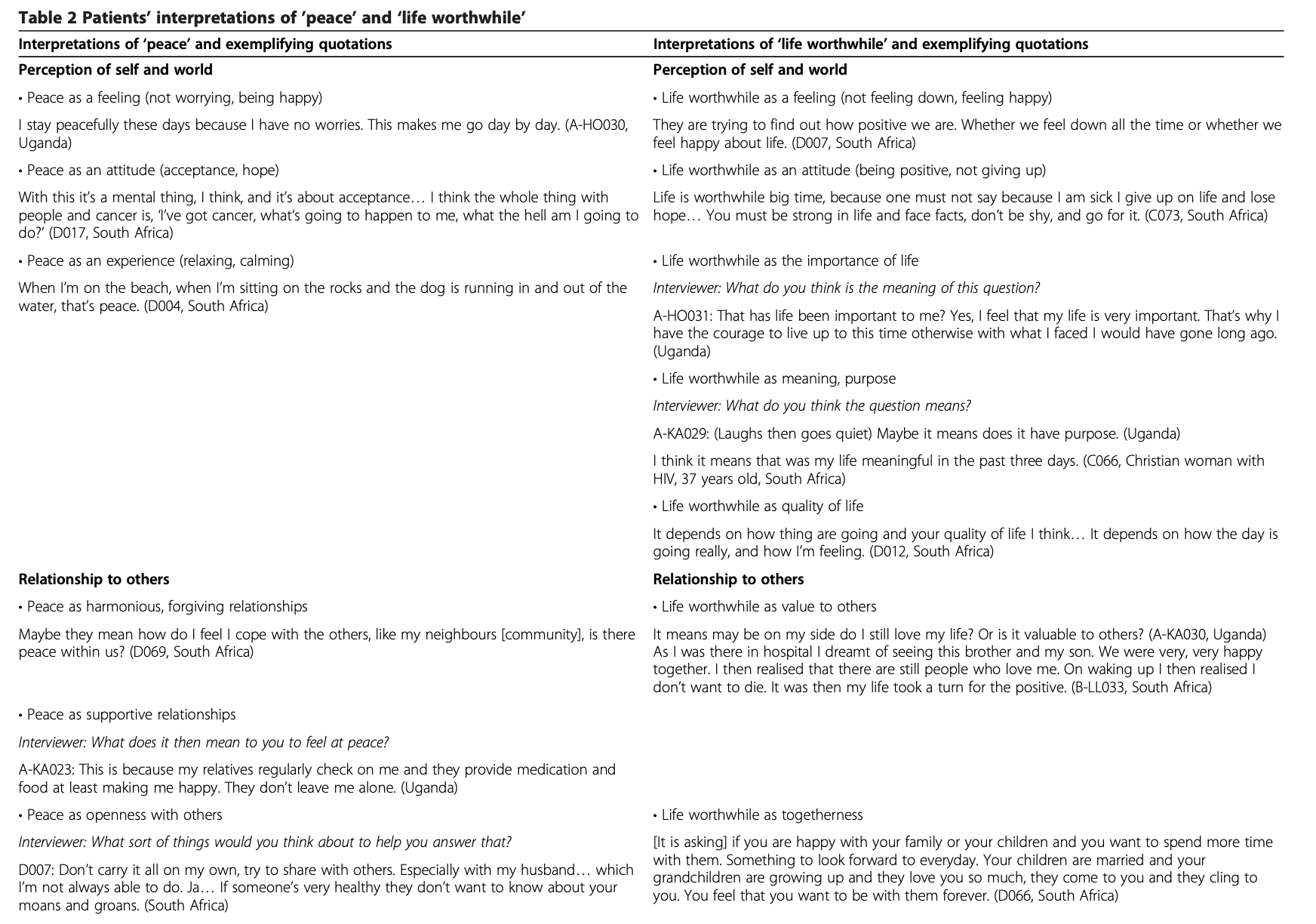
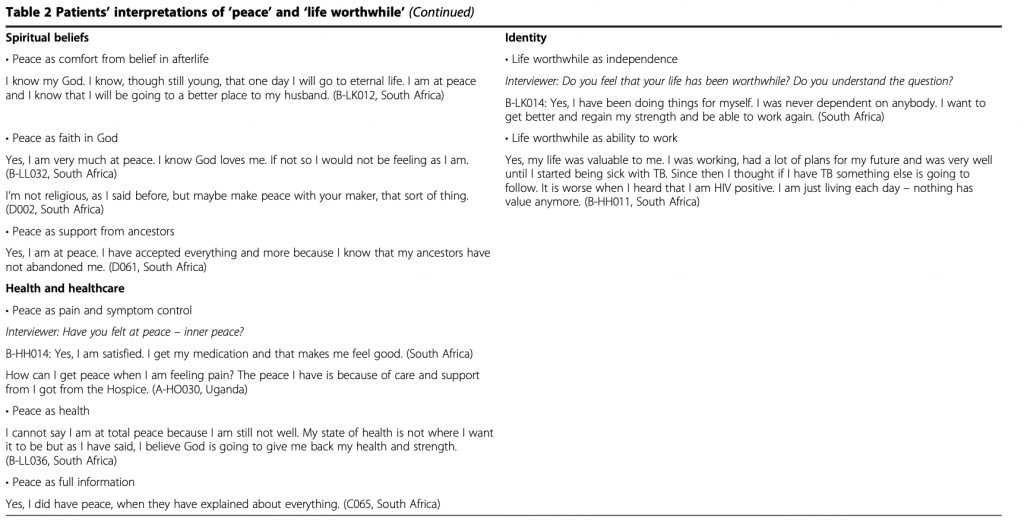
(Selman et al., 2013, pp. 6-7)
Quantitative findings (table 3)
Peace correlated the most with Spirit 8 Q1 and Q7, this means that Hypotheses (i) and (iii-vii) were met. Life worthwhile correlated the most with Q6 and Q8 (all r = 0.34, p < 0.001). (See table 3). Spiritual well-being was indeed reasonably correlated with peace (r = 0.46, p < 0.01) but only slightly correlated with life worthwhile (r = 0.18, p < 0.001). Hypothesis (ii) was not made significant, with peace and Q2 correlating only weakly (r = 0.22, p < 0.01).
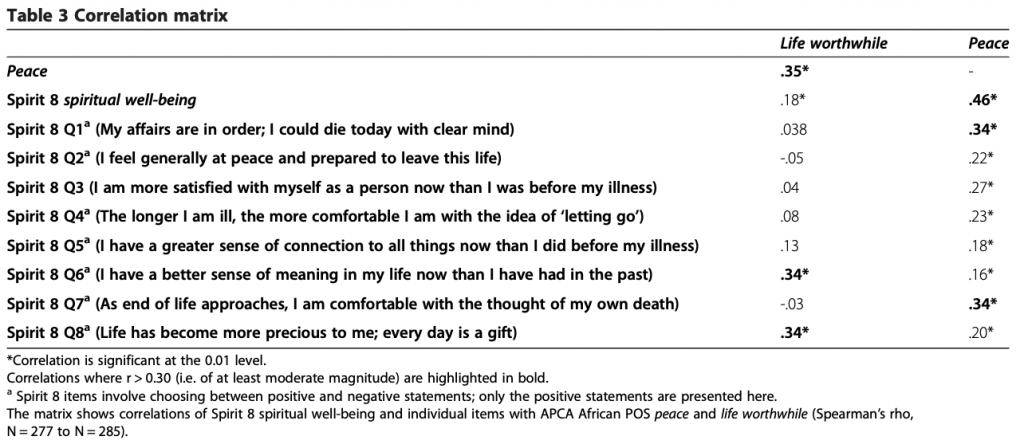
(Selman et al., 2013, p. 9)
Explanation & analysis of the mixed methods & interdisciplinarity used
The research was conducted in four palliative care services in South Africa and one in Uganda (p. 1). The study design used a mixed-methods approach with cognitive interviews including 72 interviewees to delve into the content validity of ‘peace’ and ‘life worthwhile’, and a quantitive survey (n=285) to evaluate construct validity (p. 1). There was an inclusion criterion and written informed consent, read out loud in the case of illiterate participants (p. 3). In table 1 below, participants from the cognitive interviews and the survey demographic characteristics are shown. The table arranges participants in accordance to their age, gender, diagnosis, and amongst others church affiliation, showcasing the mixed methods and interdisciplinarities used in the study (p. 5). Overall the mixed methods nature of the study proved to be of value in assessing the validity of the items as a measurement of spiritual well-being (p. 8).
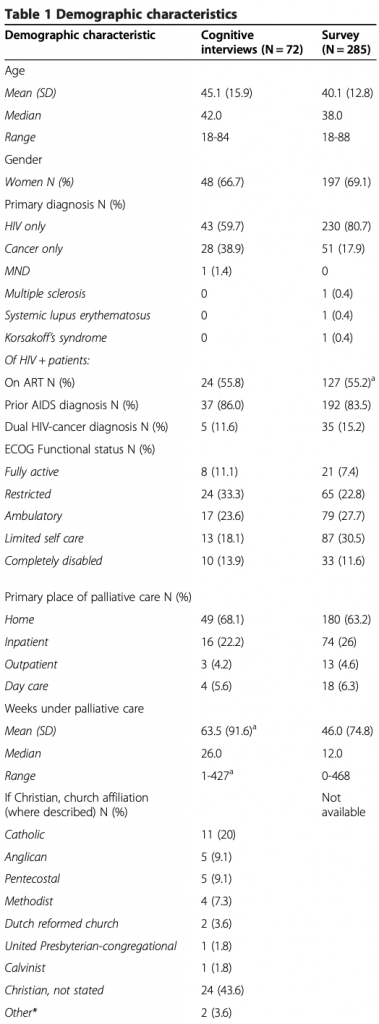
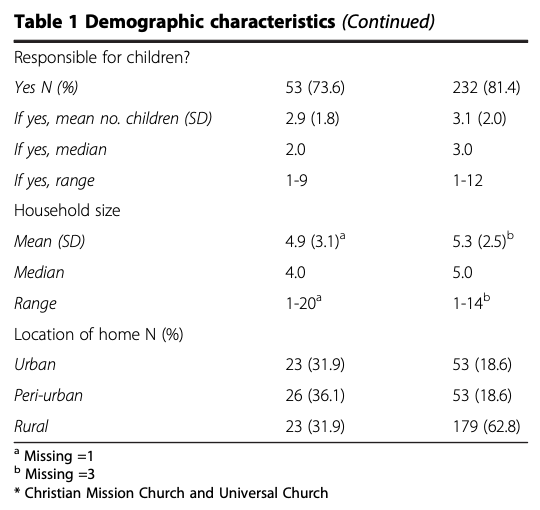
(Selman et al., 2013, p. 5)
Quantitative method
The quantitative aspect of the research included the quantitative data collection using patient surveys (n = 285 patients) while measuring with the Palliative Outcome Scale (POS) and the Spirit 8. The significance was set at p < 0.01.
The Spirit 8, is an eight-item scale developed from the Missoula Vitas Quality of Life Index (MVQOLI), a tool developed in the USA and validated in Uganda ( Selman et al., 2013, p. 3).
The outcome of which is found in table 3. A spiritual wellbeing score is produced by summing the scores for all items (possible score 8–40).
The POS is a 10-item self-reported questionnaire that determines 7 patient outcomes (including peace and life worthwhile) and 3 carer outcomes [ref 2]. The POS survey contained answers about experiences of the previous 3 days on a scale from 0-5.
In the end, it was useful to use these two surveys. As they gave two different perspectives on peace, the reflection on a three-day period being less existential and asking about peace as an overall feeling.
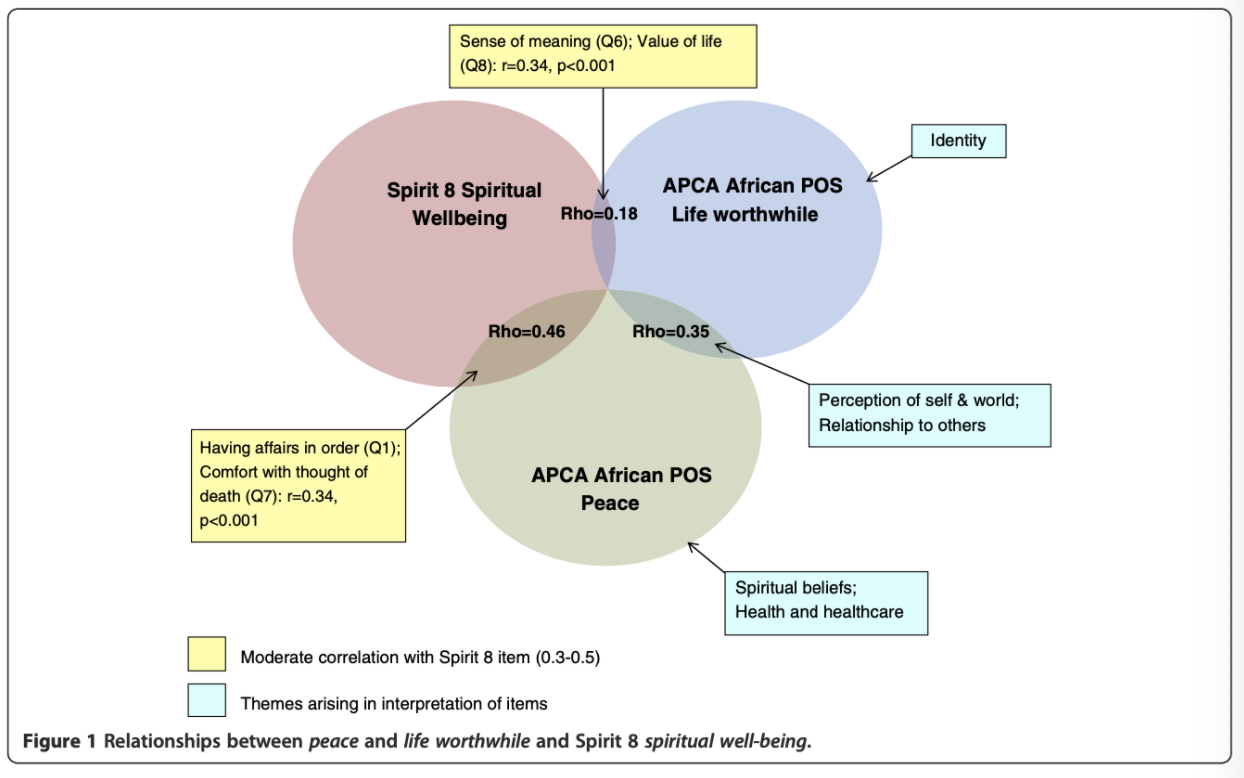
Qualitative method
The qualitative aspect of the research included conducting cognitive interviews with 72 participants who shared their understanding of feeling at ‘peace’ or ‘life worthwhile’. The interviews took place at three facilities in South Africa and one in Uganda. Patients were reached out to by palliate care researchers that were locally based at each facility. The study used a purposive sample, reaching 15-20 participants per facility, adding to 60-80 participants overall. The sample included factors of diagnosis, location, ethnicity, gender. About ⅔ were women and 60% were diagnosed with HIV and 39% with cancer. The sample was equally representative of participants from rural, urban and peri-urban locations.
The outcome of the interviews is shown in table 2 above, whereby quotes of participants' understanding of the items are highlighted. Understandings of peace in relation to the ‘self and the world’ sets links with mental health, whereby a patient relates it to being a “mental thing”.
"With this it’s a mental thing, I think, and it’s about acceptance... I think the whole thing with people and cancer is, ‘I’ve got cancer, what‘s going to happen to me, what the hell am I going to do?’ (D017, South Africa)" (p. 6)
Also, in the case of ‘life worthwhile’ in relation to ‘identity', where the patient is quoted for saying “nothing has value anymore”.
"Yes, my life was valuable to me. I was working, had a lot of plans for my future and was very well until I started being sick with TB. Since then I thought if I have TB something else is going to follow. It is worse when I heard that I am HIV positive. I am just living each day – nothing has value anymore. (B-HH011, South Africa)" (p.7)
Likewise, the importance of spirituality is heightened by examples of a patient saying
“I believe God is going to give me back my health and strength”.
All and all, the interviews allowed for imagery and a deeper understanding of the perception of the items. Although the items of peace and life worthwhile were considered to convey spiritual well-being for patients receiving palliate care in sub-Saharan Africa, it also raised other questions. To determine the content validity of these items, it would be necessary to do further research on their comprehension, taking into account the varying cultural and linguistic groups (Selman et al., 2013, pp. 6-7).
Author’s note
This research's primary subject was the outcome measurement of the spiritual wellbeing of patients with an incurable illness who are receiving palliative care. The research was based on two measurable outcomes peace’ and ‘life worthwhile’ with the two objectives construct validity and content validity. With the means to add this measurement into routine practice, in palliative care, in the Sub-Saharan Africa region. The outcome of this research shows peace and life worthwhile as two individual but related measures of spiritual well-being in African palliative care.
References
Selman, L., Speck, P., Gysels, M., Agupio, G., Dinat, N., Downing, J., Gwyther, L., Mashao, T., Mmoledi, K., Moll, T., Mpanga Sebuyira, L., Ikin, B., Higginson, I. J., and Harding, R. (2013). ‘Peace’ and ‘life worthwhile’ as measures of spiritual well-being in African palliative care: A mixed-methods study. Health and Quality of Life Outcomes, 11(1), 94.
Harding R, Selman L, Simms V, Penfold S, Agupio G, Dinat N, Moll T, Mwangi-Powell F, Namisango E, Powell R, et al: How to analyse palliative care outcome data for patients in sub-Saharan Africa: an international , multicenter, factor analytic examination of the APCA African POS. J Pain Symptom Manage 2012, 45(4):746–752.
Images
Anonymous. (n.d.) Retrieved from: https://www.deccanherald.com/opinion/panorama/supportive-care-is-important-792008.html


